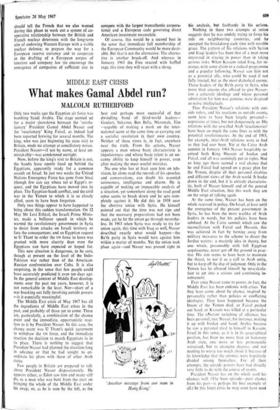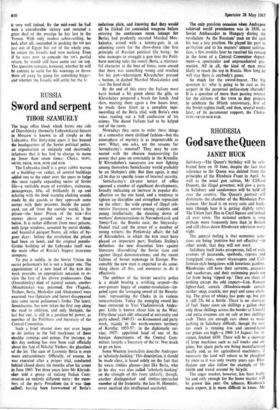What makes Gamal Abdel run?
MIDDLE EAST CRISIS MALCOLM RUTHERFORD
Only two weeks ago the Egyptian air force was bombing Saudi Arabia. The stage seemed set for a major showdown between the 'revolu- tionary' President Gamal Abdel Nasser and the 'reactionary' King Faisal, as indeed had been reported brewing for several months. The king, who was just beginning his state visit to Britain, made no attempt at conciliatory noises. President Nasser—if not by name, at least un- mistakably—was condemned outright.
Now, before the king's visit to Britain is out, the Saudis have openly lined up behind the Egyptians, apparently ready for a common assault on Israel. In just two weeks the United Nations Emergency Force has gone from Sinai (though few can say where to) at Egypt's re- quest, and the Egyptians have moved into its place. The Egyptian-Saudi conflict, and the civil war in the Yemen to which it is so closely allied, seem to have been forgotten.
Only two things appear to have happened to bring about this sudden transformation. On 12 May Mr Levi Eshkol, the Israeli Prime Minis- ter, made a bellicose speech in which he warned the revolutionary government in Syria to desist from attacks on Israeli territory or face the consequences; and an Egyptian request to U Thant to order the UN force to leave was granted with more alacrity than even the Egyptians can have expected or hoped for.
This new situation is dangerous, to be sure, though at present on the level of the Indo- Pakistan war rather than of the American- Russian confrontation over Cuba. It is also surprising, in the sense that few people could have accurately predicted it even ten days ago. In the general context of Middle East develop- ments over the past ten years, however, it is not remarkable in the least. Nor—short of a war breaking out fully involving outside powers —is it especially meaningful.
The Middle East crisis of May 1967 has all the ingredients of Middle East crises in the past, and probably of those yet to come. These are, particularly, a combination of the chance event and the immediate, opportunistic reac- tion to it by President Nasser. In this case, the chance event was U Thant's quick agreement to withdraw the UN force, and the immediate reaction the decision to march Egyptians in in its place. There is nothing to suggest that President Nasser had planned the situation long in advance or that he had sought to co- ordinate his plans with those of other Arab states.
Few people in Britain are prepared to talk about President Nasser dispassionately. He appears either, as Eden saw him and many still do, as a man who was bent from the start on bringing the whole of the Middle East under his sway; or, as he is seen by the left, as the
best and perhaps most successful of that dwindling band of third-world leaders- Goulart, Sukarno, Ben Bella, Nkrumah, Tito —capable of making a mark on the inter- national scene at the same time as carrying out a socialist revolution in their own country. Neither of these views is, in fact, anywhere near the truth. From his actions, Nasser appears a man whose basic characteristic is impulsiveness and whose basic talent is an un- canny ability to keep himself in power, even after making the most woeful mistakes.
No one who has at least seen him on tele- vision, let alone read the records of his speeches and conversations, can doubt his essential seriousness, intelligence and charm. He is capable of making an impeccable analysis of a situation, yet somewhere along the road good sense seems to break down and he acts com- pletely against it. He did this in 1958 over the abortive union with Syria. He himself pointed out that the time was not ripe and that the necessary preparations had not been made, yet he let the union go through neverthe- less. In 1963 when Syria was ready to try for union again, this time with Iraq as well, Nasser described exactly what would happen—the Beth party in Syria would turn against him within a matter of months. Yet the union took place again—and Nasser was proved right in his analysis, but foolhardy in his actions. Nothing in these two attempts at union suggests that he was unduly trying to force his rule on neighbouring countries, and he accepted the breakdowg each time with notable grace. The pattern of fiis relations with Syrian
and Iraqi leaders has been that of a man more interested in staying in power than in taking serious risks. When Kassem ruled Iraq, for in- stance, with some claim to a radical programme and a popular following, Nasser saw him not
as a potential ally, who could be used if not fully trusted, but as the most diabolical enemy. Those leaders of the Ba'th party in Syria, who more than anyone else offered to give Nasser- ism a coherent ideology and whose personal admiration for him was genuine, were despised as naive intellectuals.
Thus President Nasser's relations with out- side rulers, and his reactions to outside events,
seem here to have been largely personal— capricious at times, but not dangerously so. His relations with the so-called Arab 'reactionaries' have been on much the same lines as with the potential revolutionaries. At the end of 1963, for example, inter-Arab relations were as bad as they had ever been. Yet at the Cairo Arab summit in January 1964 Nasser hospitably re- ceived both King Hussein of Jordan and Faisal, and all was seemingly put to rights. Not so long ago there seemed a real chance that he and Faisal had agreed on a peace plan for the Yemen, despite all their personal rivalries and different views of the Arab world. It broke down in the end, but it is entirely characteris- tic, both of Nasser himself and of the general Middle East situation, that this week they are on the verge of talking again.
At the same time, Nasser has been on the whole reserved in policy. On Israel, at least until the emergence of the present government in Syria, he has been the most warlike of Arab leaders in words, but his policies have been subdued. At the Cairo summit which saw the reconciliation with Faisal and Hussein, this was achieved in fact by turning away from military measures to the scheme to divert the Jordan waters: a masterly idea in theory, but one which, presumably with full Egyptian acquiescence, never got off the ground in prac- tice. His aim seems to have been to maintain the threat, to use it as a call to Arab unity, but to keep off the day of judgment. Only in the Yemen has he allowed himself by miscalcula- tion to get into a serious and continuing in- volvement.
Ever since Nasser came to power, in fact, the Middle East has been endemic with crises. Yet they have come about by chance, inspired by personality rather than policies or conflicting ideologies. They have happened because the Imam of the Yemen died, or Faisal pushed out Saud, or Kassem was killed at a particular time. The cdnstant switching of alliances has been personal, too; Nasser, for instance, making it up with Jordan and Saudi Arabia because he saw a personal rival to himself in Kassem. Israel in this sense, as it is in its geographical position, has been no more than an honorary Arab state, one more or less permanently ostracised, but to changing degrees, and not needing to worry too much about it because of its knowledge that the enemies were hopelessly divided among themselves. For all their attempts, the outside powers have had directly very little to do with the cotirse of events.
President Nasser has on the whole used his chances well. (The Suez episode—pure chance from his part—is perhaps the best example of all.) In this latest crisis he may even have used it very well indeed. By the mid-week he had won a considerable victory and restored a great deal of the prestige he has lost in the Yemen. With only modest sabre-rattling, he had, after all, succeeded in pushing the UN not just out of Egypt but out of the whole area. In return the Israelis had won nothing. Even if he were now to concede the uN's partial return, he would still have come out on top. The question remains, however, whether he will be content to settle for his winnings or throw them all away by going for something bigger: and whether the Israelis will settle for the In



































 Previous page
Previous page